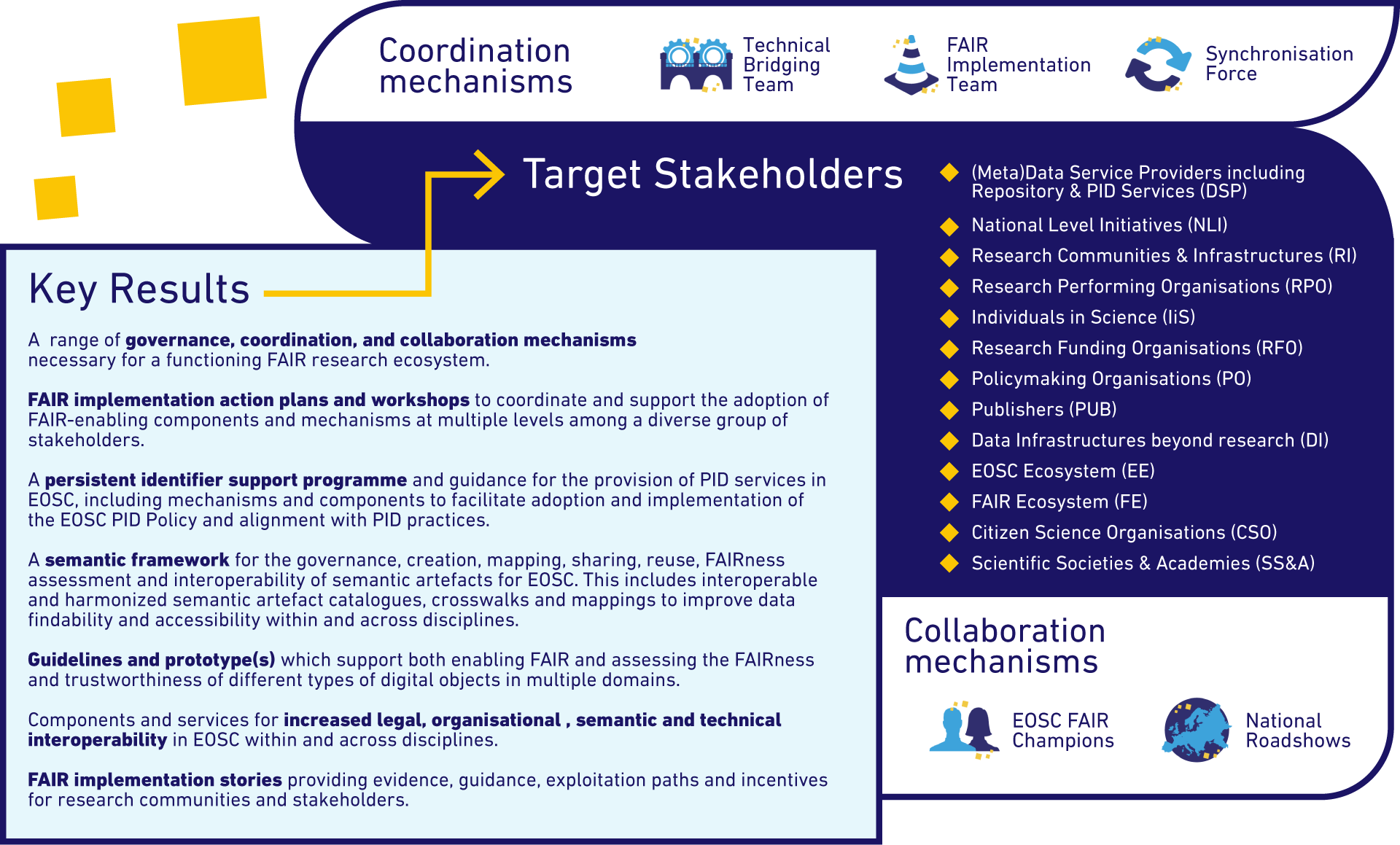Solutions for FAIR Open Science in Europe: the FAIR-IMPACT project kicks-off
The recently awarded FAIR-IMPACT project will identify and design practical solutions, guidelines and frameworks to realise an EOSC of FAIR data and services. The project starts on 1st of June and gathers 28 partners from 11 countries.

EOSC and FAIR principles
In 2015 the vision of a European Open Science Cloud (EOSC) emerged. EOSC would provide an open and trusted environment for accessing and managing a wide range of publicly funded research data and related services, helping researchers reap the full benefits of data-driven science.
EOSC is currently in its implementation phase (2021-2027) which requires active engagement and support to ensure widespread implementation and adoption of the FAIR (Findable, Accessible, Interoperable, Reusable) principles, to define and share standards and develop tools and services, to allow researchers to find, access, reuse and combine research results.
FAIR-IMPACT project
With the ambitious goal to realise an EOSC of FAIR data and services, the FAIR-IMPACT project will respond to these needs by supporting the implementation of FAIR-enabling practices, tools and services across scientific communities at a European, national, and institutional level.
The FAIR-IMPACT project will work to connect knowledge across scientific communities on persistent identifiers, metadata and ontologies, metrics, certification and interoperability aspects via a community-led approach.
Practical implementation of the FAIR principles starting with integrated use cases on four scientific domains
A set of integrated use cases on social sciences and humanities, the photon and neutron sciences, life sciences and agri-food, and environmental sciences will help FAIR-IMPACT consortium to identify practices, policies, tools and technical specifications to guide researchers, repository managers, research performing organisations, policy makers and citizen scientists towards a FAIR data management cycle.
Engaging stakeholders via open calls
Wide uptake of FAIR data principles and practices by national and European providers and repositories will be boosted via a cascading grants mechanisms, that will provide €500,000 funding via open calls to support around 50 projects to embed FAIR components and mechanisms across domains, geographic areas and stakeholder groups, using a transparent and open use case selection approach.
Coordination mechanisms
In order to build a web of FAIR data and related services FAIR-IMPACT will be supported by three coordination mechanisms:
- a Technical Bridging Team, leading and ensuring the technical alignment between FAIR-IMPACT and other strategic initiatives in the framework of the European Open Science Cloud (namely FAIRCore4EOSC, EOSC Future and the EOSC Association);
- a FAIR Implementation Team, supporting adoption and implementation of FAIR-enabling practices, policies, tools or technical specifications;
- the Synchronisation Force, built on the successful Synchronisation Force series from the FAIRsFAIR project, in charge of establishing a dialogue among the various projects, initiatives and actors in both EOSC and FAIR ecosystems. to reduce redundancy and ensure that solutions are more widely promoted, sustainable and can be transferred to the relevant EOSC Partnership and current and future EOSC stakeholders.
By enabling the FAIR principles for EOSC across scientific communities, stakeholder groups and research outputs at a European, national and institutional level, FAIR-IMPACT will improve the access to and management of increasing volumes of FAIR data and other research outputs contributing to transforming the way researchers share and exploit research outputs, ultimately leading to better quality, validation and higher productivity of research.
About the project
FAIR-IMPACT “Expanding FAIR solutions across EOSC” is funded by the European Commission Horizon Europe programme (HORIZON-INFRA-2021-EOSC-01-05 101057344). Coordinated by DANS and supported by 27 additional partners from 11 countries, the project has officially started on the 1st of June 2022.
FAIR-IMPACT will build on the successful practices, policies, tools and technical specifications arising from FAIRsFAIR, other H2020 projects and initiatives, and from the FAIR and other relevant Working Groups of the former EOSC Executive Board.
Adapted from press release <>
eScienceLab in FAIR-IMPACT
The eScience Lab at the Department of Computer Science of The University of Manchester is participating in FAIR-IMPACT, contributing expertise on sharing Research Objects using Linked Data with RO-Crate and Bioschemas.
Use cases from WorkflowHub will contribute to FAIR-IMPACT work on persistent identifiers and metadata schema mappings.
UNIMAN contributions:
- WP3: Persistent Identifiers (lead: CSC)
- T3.2: Integration of PID practices into FAIR data management (lead: CSC)
- T3.2.1: PIDs in data production workflows
- T3.2: Integration of PID practices into FAIR data management (lead: CSC)
- WP4: Metadata and ontologies (lead: INRAE)
- T4.2: Semantic artefact lifecycle and catalogues (lead: INRIA)
- T4.2.1 Semantic artefact engineering, adoption and description
- T4.2.2 Interoperable semantic artefact catalogues
- T4.3: Standard metadata for research software (lead: INRIA)
- T4.4: A framework to create, document and share semantic artefact crosswalks and mappings (lead: e-SDF)
- T4.2: Semantic artefact lifecycle and catalogues (lead: INRIA)

